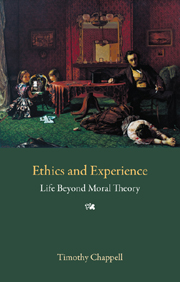Book contents
- Frontmatter
- Contents
- Acknowledgements
- 1 The turn to reason: how human beings got ethical
- 2 Demarcation: what does “ethical” mean?
- 3 Motivation: why be moral?
- 4 Deliberation: the question of reason
- 5 Introducing subjectivism and objectivism
- 6 Five arguments for ethical subjectivism
- 7 The content of ethics: expressivism, error theory, objectivism again
- 8 Virtue ethics
- 9 Utilitarianism
- 10 Kantianism and contractarianism
- 11 Theory and insight in ethics
- Further reading
- Bibliography
- Index
6 - Five arguments for ethical subjectivism
- Frontmatter
- Contents
- Acknowledgements
- 1 The turn to reason: how human beings got ethical
- 2 Demarcation: what does “ethical” mean?
- 3 Motivation: why be moral?
- 4 Deliberation: the question of reason
- 5 Introducing subjectivism and objectivism
- 6 Five arguments for ethical subjectivism
- 7 The content of ethics: expressivism, error theory, objectivism again
- 8 Virtue ethics
- 9 Utilitarianism
- 10 Kantianism and contractarianism
- 11 Theory and insight in ethics
- Further reading
- Bibliography
- Index
Summary
My own suspicion is that the universe is not only queerer than we suppose, but queerer than we can suppose.
(Haldane 1927: 208–9)In §5.2 we saw this definition of the position that I have been calling ethical subjectivism:
Ethical subjectivism. No ethical judgements are objectively true.
I contrasted this with the position that is the strict negation of ethical subjectivism – ethical objectivism:
Ethical objectivism. Some ethical judgements are objectively true.
As I noted, this objectivist position is not the most interesting one, since it is much too weak. This sort of ethical objectivism is true if there is only one completely inconsequential objective truth in ethics – say, that smiling at strangers is nice – and everything else is subjective. What we are really interested in (and what I shall be talking about from here on) is the far stronger position that Chapter 5 calls full ethical objectivism:
Full ethical objectivism. Very many important and interesting ethical judgements are objectively true.
In Chapter 5, in response to the last of the four key questions to which we were led by our initial definition of ethics as the use of reason to answer the question “How shall we live?”, I began a debate between (full) ethical objectivism and subjectivism. In Chapters 6 and 7 I take this debate further. In Chapter 6 I develop and assess some more sophisticated arguments for what I call ethical subjectivism.
- Type
- Chapter
- Information
- Ethics and ExperienceLife Beyond Moral Theory, pp. 49 - 72Publisher: Acumen PublishingPrint publication year: 2009

